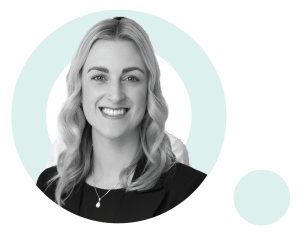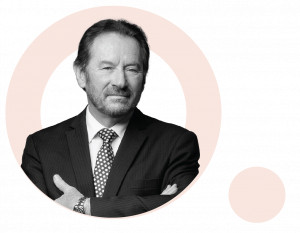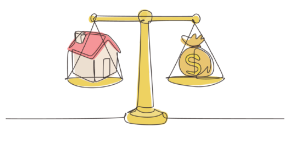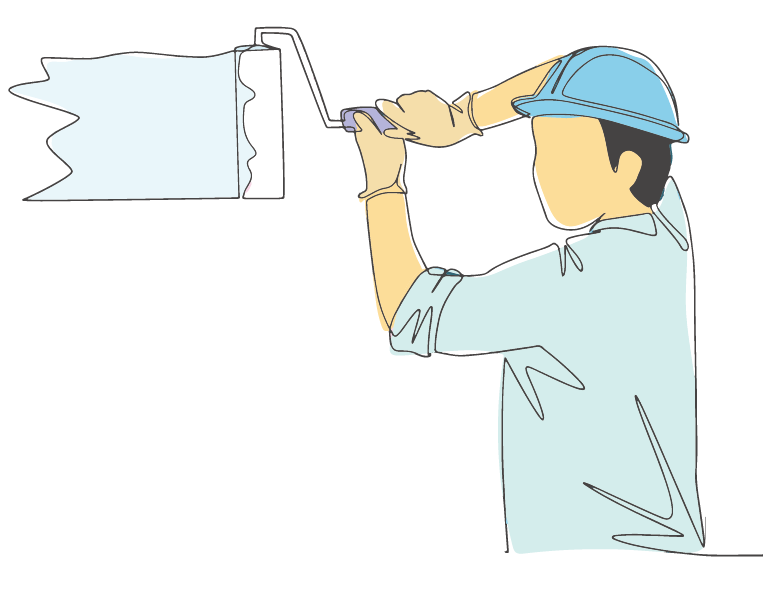| Episode: | EP111 |
| Show Title: | Securing that Property in Tassie’s Tricky Market |
| Cast: | Patrick Berry & John McGregor |
| Show Length: | 22 minutes 12 seconds |
[intro music]
Going once… going twice… SOLD! You’re listening to The Property Pod!
Patrick: All right, everyone. Here we are back at The Property Pod for our second week in a row of filming without Aaron at the mics and I’m joined, like always, by John McGregor.
John: Like your resident Stalwart. [laughter]
Patrick: I tell you what, John, you’ve already seen me a couple of times I suck at working these buttons, [laughter] so please come back as soon as possible, Aaron.
John: Yeah exactly. And I suppose we could switch it up mate and I can try it next time.
Patrick: I’d love for you to try these buttons because I’m like a sinking fish over here like, “save me” [laughter]
John: Man well, we’ve got this! We got this!
Patrick: We do, indeed. And this week, we’ve been sort of wrecking our brains thinking what can we talk about which is weird for real estate agents because normally, we don’t shut up, isn’t that right?
John: No, exactly.
Patrick: So, what caught my attention this week, John, that I thought that to be worthwhile sort of talking about is how hard it is to buy a property in the marketplace at the moment? Like a lot of people have been struggling and a lot of people have been really finding it difficult to secure that next property. And probably just having a look at some of the experiences that you and I have had over the years and recently as well in trying to buy a property.
John: Well, it is fascinating because when you’re on the other side, all of a sudden, you think you’re trying to be professional all the time. You experience all the emotions that you’re sitting there trying to coach another person through and instantly, if it’s your property, it’s worth more than you know than it is. If you’re trying to purchase, it’s hard to get you wrap your mind around having to pay for this because like, “oh, but I remember when I could buy for that” and even, because I suppose, I’ve been trying to help my partner buy a property as well like I’m going through all those emotions for us and then when you secure one, it’s like, “oh my god, didn’t make the right decision to talk about too much?” and then all of a sudden all those, “but I could have got that” “oh, that’s a better opportunity now”. So, even though it’s our job to actually talk about the fact that we go through those same experiences, I think it’s just interesting.
Patrick: Well, it’s funny to say that because Abbey and I have been looking for a while now for a block of land and it’s almost like working in the industry is detrimental to… You would think that working in the industry helps you be able to find that property and buy that property [John agrees] but for me, it’s actually been the opposite experience because now, I’m second-guessing every decision I’m making when it comes to buying property like, “Oh geez, I know what this property’s worth. I’ve checked the data online, I shouldn’t pay any more than x or y” and it’s a really difficult thing to navigate when you’re on the other side of the coin.
John: Because you’re fighting to your, like you said, with your knowledge. You are becoming your own worst enemy, like you could push a little bit more but you don’t and you almost become stubborn, is that what’s happening?
Patrick: It’s very much so. I’m definitely becoming stubborn because I know that properties are going to sell for way more than I’m prepared to offer for them and that’s probably the reason why I haven’t been successful in winning one. [John agrees] And it’s I think because, like you described, because we live and breed this seven days a week,
365 days a year, I’m still stuck thinking about a couple of years ago when I could have bought a property for x and now having to pay y. I’m thinking, “Oh yes, I know the market’s shifted and that’s what the new price is but it’s still hard to comprehend.”
John: Well, the other challenging part is if you say because you’re in it, you can get a good deal. And you can if you’ve got no ethics. Because the challenge when it comes to us buying a house too is that by all accounts, yes, we might have early access to think we could probably sit there and explain and encourage your owner to accept our offer, but the problem is if we don’t do it above board, well then, we’ve got the capacity to rip the client off and eventually completely lose our license as a result of doing the wrong thing. [Patrick agrees] Even the idea of getting the inside track often doesn’t actually work in our favor because unfortunately, we can’t take advantage of it.
Patrick: No, that’s exactly right. I find myself hoping that the dream property that I want to buy is listed by another competing agent so that it doesn’t end up on the stock in our office here because if it ends up here, I’m probably paying 10% more than what anyone else will pay for the property because I want to be able to ensure that I distance myself.
John: Absolutely. And then all the disclosures that come with it. And that was sort of one thing I’ve been wrapping my mind over the last couple of days. I’d always had it in mind that there was something lined up for us that I think would have been perfect for my partner and at the same problem, too, it’ll end up I know… it’ll probably end up outside the realm of what she can afford if it goes to market for sale, so in all respects, the owner would probably be comfortable with what should be able to pay but then, as a professional, I know that they’ll lose out on a lot of potential income [Patrick agrees] so you can’t make that work and so then, we’re securing something it’s like, “oh, it’s not what I wanted for her,” but the problem is I have to because we can’t get what we wanted because it came through our agency. [Patrick: Yeah, definitely.] It’s such a…
Patrick: And look, you guys were making an offer the other night on a property with a competing agent and asked my opinion on it and it started making me think as well like having someone in your corner like you like to speak about all the time and getting external advice on “should we do this? should we not do it?” it even applies to us here on our day-to-day when we’re buying personally. [John agrees] Just you came to me and you’re like, “You know, Pat, they want x but you know, we’re only prepared to pay ten thousand dollars less than that.” And it was only through conversations between each other that we both came to the realization that you’re going to have to pay what the owner wants to have any chance of securing it.
John: Yeah and I needed your… it was handy to have your reassurance because it was articulating, “oh this is a good location, good spot, like that complex” It does make sense but it’s like I still needed yours like, “mate, is this if we’re thinking right, am I like trying to justify something that’s probably not correct?”
Patrick: Yeah and look, the way we ended up justifying, it was quite an interesting one and it just refers back to how the market is continuing to grow at the moment, so, we’ve had a good mate, Simon Presley, who’s reached out to us recently and said that Hobart’s got another 20% plus growth this year and a combined 40% growth over the next two years. So, look, that just sounds so ridiculous but the way the market’s going, it probably will happen. So, if you’re a buyer out there and you know you’ve got yourself to a position where you’re one of two buyers that are about to win a property and you’re being stubborn like I have been over the last six months in buying a place and you’re not prepared to pay that extra 10, 20, 30 thousand, whatever it may be, maybe the right decision is just to pull the trigger and pay that extra bit because in two years time, you might be kicking yourself that you didn’t do it.
John: Well, in our case, it was an additional five and then it’s like okay, in the next 30 years, is it really going to matter? Probably not. And the other part we looked at that’s sort of still giving a little bit of reassurance even though I’m still nervous about it, was it at the median asking price around about where units are selling for? And yes it is. And that’s sort of another thing too, I suppose, because it’s going to be… it was purchased as an investment just to get a name attached to a property again. At least then, if the units bought at the roundabout, where all the units are selling, either usually at median price or below, if anything happens, you’re always going to be okay because you can get in and out of the market quickly. Whereas, I think a lot of the problems have occurred where people have got really stuck though, is that when they’ve purchased a home. So, let’s say the media in an area is 500 000. They’ve bought this for 580 000 for the exact same property where they’re so far apart and if something does happen, they get stuck because they really can’t move that asset off quickly. [Patrick agrees] So, I mean it’s a reality that I’ve seen, we have to sell it. The biggest loss a client I had to help through was that lost sixty thousand dollars–that was for a property in Old Beach. So, it does happen. That’s why that risk assessment is to do what you can, but you know, we were in a situation, it had to be an emotional purchase like we were like, “Okay, fair enough. We’ll just pay what they have to pay.”
Patrick: Look, and I think you’re right–you made the right call this week. Helping secure that property, I think, it’s position, it’s location, it’s a low maintenance property, it’s going to be a good investment property for years to come.
John: Hopefully and that’s sort of… ultimately, if you look back to the fundamentals, right location, easy access… [stutters] sorry [laughter] It can fit multiple different tenants and we know that complex is always tenanted like 100% no drama. But all that said, it’s still an emotional move first and then you try and justify it later. And I guess, because for me as well, where if it was only just involved as an investment, you’re doing numbers and numbers alone and so, if you were to say the numbers on that property, would you have paid that much as like in this investment purchase purely? Probably not. However, as the means that it’s something that you wanted to move yourself back into the markets are like okay, we’re going to have to adjust the numbers and the expectations in order to secure the property and that sucks.
Patrick: I think it’s really hard at the moment as well if you’re an investor to buy a property and base it only on numbers with no emotional attachment to it. Because the market, it is moving fast and it’s hard to go in and say like the rental return on this is x so therefore, I shouldn’t pay any more than this price because realistically, that’s probably not going to get the deal done these days. So, I think for a lot of investors at the moment that are choosing to buy, they’ve got to be looking at it from a more long-term perspective and a capital growth perspective as well where in the past most investors would probably only buy a property based on rental yields and look at it from that return so I don’t know if that’s what you believe, John, but that’s sort of the shift I’ve probably seen in recent times.
John: In Tassie, 100%. And I guess that’s sort of most seen in the change in the return on those areas like Bridgewater and Herdsmans Cove, our lowest socio-economic areas. Where they never ever experienced growth ever but the yield on them was massive.
Patrick: And I tell you what, those people that are cashed in on that yield sort of six years ago, when they were picking up a property in Bridgewater for 150, 170 thousand, they are living life now because they’re now turning those properties back over with very minimal work during that time, early fours [John agrees] 400, 420, we’ve sold one recently for 450 in the area.
John: Yeah well, I just saw one pop up for over 500 now, obviously, one of the bigger bigger ones but the idea that that area would start to stretch over half a million, it was just you know, incomprehensible. [laughter]
Patrick: It’s definitely shifted that suburb has, that’s for sure. And look, lots of suburbs go through that transformation and that was ropey a few years back. It was probably a little bit earlier than what Bridgewater was,you’ve now got to look to suburbs like Gagebrook and Clarendon Vale to start looking for those cheaper options but their time will come and they will improve in their value too.
John: Yeah, absolutely. And that, I was only chatting with a client who’s looking to purchase her second investment property actually through us and where she was asking like, “what is it possible?” Look, anything’s possible through gentrification which is that thing where Bridgewater I think did it very well with the assistance of those Centacare Evolve projects where even housing has changed the way in which they want to develop projects because wasn’t it that 70% ownership in those developments, is that right, mate?
Patrick: I think it’s 70% rented and 30% ownership. I think, but I think what their goal is, as a whole, is to get the overall ownership of all of Bridgewater to 50-50, so 50 percent owned 50 percent rented where it’s traditionally been 70 to 80% rented and 20% owned. So, that’s why they are selling off a lot of their properties to help try to shift that back a little bit. [John agrees] but for those guys and the change of Bridgewater goes far beyond just the buildings that are happening out there, it’s the community projects that companies like Centracare are involved as well like a lot of people wouldn’t realize it but they’ve been involved in helping some of these new playgrounds and parks get off the ground and help fund it, just footpaths and bus shelters and things like that. They’ve put in money into the community to improve the area just to help that overall shift in the suburb.
John: Yeah yeah, well, see that’s again a really good indicator of where it will move to and even I find that those that are not like a new Tasmanian specifically, they don’t have that same negative identification with that suburb like a lot of those of us that are born and bred here have. And obviously, there’s still little small pockets but if just with that positive sense of ownership into that suburb breeds positive sense of ownership in that suburb across the board, so, if you can position yourself in those areas with a long-term view, well then obviously, it’ll probably perform exceptionally well.
Patrick: Yeah, definitely.
John: I suppose… I’m curious, mate, like thinking back to your first home, did you do a build or did you do a purchase? I can’t remember.
Patrick: My first tip in the property industry was actually jumping in the deep end and building a uni-complex actually. So, I had a piece of land in Rosetta and developed that into two units with the idea of selling one and that would help offset the money to be able to me own a part of the other one. [John: Yeah gotcha] And at the time, I was new into real estate. I didn’t really know what I was doing but I had some great people around me that helped me through the building process and I did it as what you call an owner builder which is not really done anymore. So, normally, most people have to go through a building company where I did it–I bought the land, I just contracted out the plumber, the electrician, the chippy, to do all their bits and pieces to actually build the entire property. But I was technically the builder.
John: Yeah yeah, so because I’ve made that a lot tighter and bit harder these days as well, isn’t it?
Patrick: Yeah, so you now do have to have a building license, I believe, to be able to do what I did. It still all had to go through sign offs and everything like normal but I guess I was more like a contract manager–like I was site manager, just making sure the right person had the right tools at the right time. So, making sure we ordered the right amount of material for the chippy to frame up the property and things like that sort of was the job that I was left to do on a weekly basis. John: You think you’d do it again?
Patrick: Um… yeah. It’s busy. And there’s a lot of extra work involved and you can definitely see why the building companies save like charge you what they charge because there is more to it than just the actual trades on site, building the physical property, [John: –following a plan] Yeah, so there is a lot to it but no, I’d go again. And it definitely helped set me up to be able to then buy my current property that I live in now, so that was a bonus out of it all.
John: Yeah and I guess then if you extend that to what the ability to just save a little bit of extra money to get more value out of your investments, even your first home. It’s that reminder that you don’t need to have everything from day one, obviously, yours is an exceptional example because you started building. [Patrick agrees] But in this instance, where you’re looking for your first home and you want what you’re living in with your parents who’ve had their second and third move. It’s like, yeah that’s right, just start small. Let yourself play the game of patience.
Patrick: Yeah and look, you did that very well with your very first investment into the market. [John agrees] I remember your little unit out there at Claremont.
John: Yeah, a block of four. It was a good little spot actually but it was just a simple two-bedroom unit.
Patrick: I think you only invited me only once there [laughter] but anyway, I’m gonna move fast there [laughter] and I think it was only because I was picking up Simon. [laughter]
John: Admittedly, the door was always a lock bait so you could have just rocked up and I would have been fine. [laughter] There was never any food in the fridge. [laughter]
Patrick: It sounds like a true uni house.
John: But the other thing too is that I get this call from somebody like, “Oh John, all the–phone’s ringing–” you’re like, “Oh John. All the [ __ ] is gone” it’s like, “what do you mean?” It’s like, “I had a [ __ ] that yesterday” “yeah, it’s all gone” “yeah you’re gonna need to get some more” it’s like, “what?!?” [laughter]
Patrick: I guess that’s the risk of the open door policy, John. [laughter]
John: Yeah, but it was cool like it was a great little entry unit. And that was obviously encouraged by I think mum and dad at the time that was through our business.
Patrick: Yeah and now you’ve moved–oh sorry– and now you’ve moved into buying another property–you’re renovating it from memory and looking to build a unit potentially in the backyard, so future development.
John: Yeah exactly. So, it’s sort of then for a similar situation where you started, but you know, it certainly couldn’t have done that to that extent without first making a move many years ago, so it’s nice I think that it’s again “when would you get in and when would you get out” is it well normally, it’s that, you know, when you want to get in when you want to get out.
I think, normally though, that I did like this line. It’s “time spent in the market” so time in the market, not timing the market, where most fortunes are made. And I think it’s that worry constantly is like, “am I buying at the wrong time? I’m going to be buying at the wrong time. I’m going to be buying at the wrong time.” Well now, if people spend 40 or 50 years within a property market and I guess, provided you’re looking at all those little fundamentals– you’re not trying to be too smart by buying out in a mining town thinking about getting a massive bank really quickly. You’ll be okay[Patrick agrees] and that was sort of I suppose going back to the property that we’ve just bought is all right. I was nervous about getting it, but you know what? All the fundamentals are still there, so we’ll be okay. And there won’t be any real… there’s a very very small risk of that ever biting us in the butt and if you can remember that, you are looking for your first home–you’re trying to get in. Just don’t try and be too smart about it.
Patrick: So, that’s our key takeaway, like, we’re almost 20 minutes into this podcast, John, and I’ve been sitting there thinking, “what are we actually thinking about?” [laughter] So basically, what you’re saying is the key takeaway is to get into the market where you can and know that all will be good potentially. [laughter]
John: That’s the worst advice ever.
Patrick: Yeah, I really need to work on my pitch.
John: I guess the thing is that’s the point of this conversation. This was like just speaking real, like not pretending like we’re so smart. Because it happens. It’s like all the things that you know can sometimes get thrown out the window, but this is like you know, you’ll be okay. If you don’t go too far, if you’re sticking around the media in a suburb and it’s got all the fundamentals, you’ll be okay. [Patrick: Beautiful.] But I suppose, in the end, if you’re trying to be too smart about it, that’s when you can sometimes get stung.
Patrick: Yeah and look, we may not know–we may not sound like we know what we’re talking about today, I think we’re a little bit off, but we’re only a phone call away–my phone won’t stop calling; sorry about that, everyone–we’re only phone calls away and in a non-microphone situation, we’re normally a lot better. [John agrees] So, always happy to sit down and sort of help people understand a certain suburb or even if it’s a property listed with another agent that you’ve got your eye on but you don’t know the best way to attack it, like John and I are happy to give you a half an hour, hour of our time, just to go through a contract, help you strengthen it where you can to improve the look of it because you’re going to be in a multiple office situation. So, it’s all about just knowing the little one percentage that you can do to a contract as well just to make it look better, so you have a better chance of winning it because it’s not always the price that ends up getting the deal done.
John: No. Absolutely not, absolutely not. And you know, that was I suppose, in some respects, when I’ve got the professional hat on, like all of a sudden, the advice completely changes–much more succinct and it makes a lot more sense. And then it’s just a reminder sometimes too is this like, hey, I get it. It’s not easy like it is really emotional. We go through those same experiences as well and I guess that was sort of part of the fun of just having a chinwag about this specific situation.
Patrick: Yeah, I think what we wanted to let everyone know is that we struggle with buying houses just as much as you, guys, do. [John agrees] We never know the right move to make and I think the only way you’ll ever know the right move to make is to have conversations with people and seek advice and just get second opinions from people because as much as we are here to help you buy a house, if the listing’s with us, we also are working for the vendor. So yeah, it can never hurt to go ask somebody else for a second opinion or some one percent of this advice where you need it.
John: Hundred percent!
Patrick: Well, I think we scraped together an episode [laughter] maybe in there. If you’ve got this far, well done. Like I’m sure, the rest of you, guys, are all thinking like “I hope Aaron’s back next week” I’m sorry to report–
John: –with some actual topics to discuss.
Patrick: I’m sorry to report Ithink he is still a couple more weeks away but hey, we’ll be excited to get him back when he is in the studio in the office again.
John: Yeah exactly. It’s cool, that was fun.
Patrick: Thanks, everyone, for listening and look forward to next week’s watching John work these buttons [laughter] and hopefully, we can get a show that’s a little bit more succinct.
John: I’m gonna just get one of those little like things, you know, those birds that tap on the desk, [laughter] that’ll work.
Patrick: All right! See you, guys. Thanks for listening!
[extro & disclaimer]
You have been listening to The Property Pod, recorded and edited by 4one4 Media House in conjunction with 4one4 Property Co. This podcast is general information only and the thoughts and views expressed are the opinion of our panel and listeners should always seek to use their own investigation into any topic we discussed to ensure they fully understand their own situation. It does not constitute and should not be relied on as purchasing, selling, financial, or investment advice or recommendations, expressed or implied, and it should not be used as an invitation to take up any agent or investment services. No investment decision or activity should be undertaken on the basis of this information without first seeking qualified and professional advice.

























